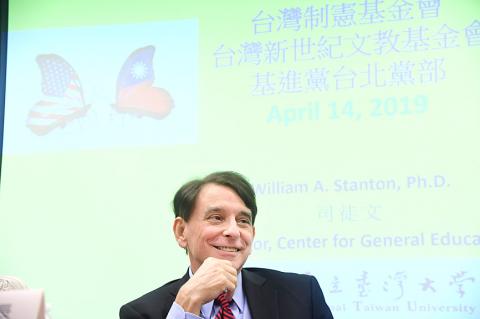Cross-strait unification is not in the US’ interests and the US government should make it clear that it would not support unification unless Taiwanese welcomed such a change after China becomes democratic, Former American Institute in Taiwan director William Stanton said yesterday.
Stanton made the remarks during his keynote speech at a conference held by the Taiwan New Constitution Foundation to mark the 40th anniversary of the Taiwan Relations Act (TRA).
He gave an overview of the Three Joint Communiques between the US and China, saying that the US signed them based on expectations that were later proved to be “totally wrong.”

Photo: CNA
The expectations included that the US would be able to build a long-term relationship with China that would result in mutually beneficial cooperation on political, economic and strategic matters, and that Taiwan, then under the autocratic leadership of Chiang Kai-shek (蔣介石), would soon become part of greater China, he said.
The communiques are “relics of the Cold War” and are “factually inaccurate,” he said.
For example, the 1972 Shanghai Communique’s central claim — that the US acknowledges that people on both sides of the Taiwan Strait maintain there is but “one China” and that “Taiwan is a part of China” — “has no factual basis,” he said.
While that might be true to Mao Zedong (毛澤東) and Chiang, nobody asked the people on either side of the Strait, he said.
The second communique, signed in 1979, states in a similarly fuzzy manner that the US acknowledges the Chinese position that there is but “one China” and that “Taiwan is a part of China,” he said.
“I may acknowledge that you think I am crazy, but that does not mean I agree with you,” he said.
However, “if the first two communiques are flawed, the third communique is just totally wrong,” he said.
While the communique signed in 1982 states that the US would gradually reduce arms sales to Taiwan, it never did, he said.
Then-US president Ronald Reagan was unhappy with the communique and partly as a result fired then-US secretary of state Alexander Haig and agreed to the “six assurances,” Stanton said.
The US’ policy on and agreements with Taiwan are complex, he said, adding that they cannot be neatly summed up by Beijing’s “one China” principle.
As the US seeks to maintain non-official relations with Taiwan, it has imposed on itself a number of restrictions, but there are simple measures that it could adopt to improve relations, he said.
For example, it could avoid referencing the term “one China” and the Three Joint Communiques, while referring to the TRA and the “six assurances” more often, he said.
It should also adjust a policy then-US president Bill Clinton announced in 1998 that the US would not support the admission of Taiwan into any organization where statehood is required, he said, adding that it contravenes the TRA.
It should also strengthen cooperation with Taiwan in regional security and trade, he said.
The US has become more realistic about what China is and has more understanding of Taiwan’s importance, he said.
He would like to see “a clear statement” from the US that it does not support unification “unless and until China becomes a free and democratic country where the rule of the law and respect for human rights are fundamental principles” and that Taiwanese welcome unification, he said.
“A secure and democratic Taiwan is just as critical as peaceful cross-strait relations for a stable and secure Asia,” he added.

Taiwan would welcome the return of Honduras as a diplomatic ally if its next president decides to make such a move, Minister of Foreign Affairs Lin Chia-lung (林佳龍) said yesterday. “Of course, we would welcome Honduras if they want to restore diplomatic ties with Taiwan after their elections,” Lin said at a meeting of the legislature’s Foreign Affairs and National Defense Committee, when asked to comment on statements made by two of the three Honduran presidential candidates during the presidential campaign in the Central American country. Taiwan is paying close attention to the region as a whole in the wake of a

President William Lai (賴清德) has appointed former vice president Chen Chien-jen (陳建仁) to attend the late Pope Francis’ funeral at the Vatican City on Saturday on his behalf, the Ministry of Foreign Affairs said today. The Holy See announced Francis’ funeral would take place on Saturday at 10am in St Peter’s Square. The ministry expressed condolences over Francis’ passing and said that Chen would represent Taiwan at the funeral and offer condolences in person. Taiwan and the Vatican have a long-standing and close diplomatic relationship, the ministry said. Both sides agreed to have Chen represent Taiwan at the funeral, given his Catholic identity and

Chinese Nationalist Party (KMT) Chairman Eric Chu (朱立倫), spokeswoman Yang Chih-yu (楊智伃) and Legislator Hsieh Lung-chieh (謝龍介) would be summoned by police for questioning for leading an illegal assembly on Thursday evening last week, Minister of the Interior Liu Shyh-fang (劉世芳) said today. The three KMT officials led an assembly outside the Taipei City Prosecutors’ Office, a restricted area where public assembly is not allowed, protesting the questioning of several KMT staff and searches of KMT headquarters and offices in a recall petition forgery case. Chu, Yang and Hsieh are all suspected of contravening the Assembly and Parade Act (集會遊行法) by holding

Lawmakers from the Democratic Progressive Party (DPP) yesterday established a friendship group with their counterparts in Ukraine to promote parliamentary exchanges between the two countries. A ceremony in Taipei for the Taiwan-Ukraine Parliamentary Friendship Association, initiated by DPP Legislator Chen Kuan-ting (陳冠廷), was attended by lawmakers and officials, including Deputy Minister of Foreign Affairs Francois Wu (吳志中) and European Economic and Trade Office in Taiwan Director Lutz Gullner. The increasingly dire situation in Ukraine is a global concern, and Taiwan cannot turn its back when the latter is in need of help, as the two countries share many common values and interests,